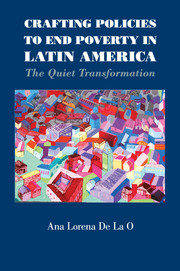Book contents
- Frontmatter
- Dedication
- Contents
- List of Figures
- List of Tables
- Acknowledgments
- 1 Introduction
- 2 The Universe of Cash Transfer Programs
- 3 Politics of Fighting Poverty
- 4 Explaining Policy Adoption and Design
- 5 Explaining Policy Outcomes
- 6 Conditional Cash Transfers and Clientelism
- 7 The Electoral Bonus of Conditional Cash Transfers
- 8 Conclusions
- Appendix
- References
- Index
8 - Conclusions
Published online by Cambridge University Press: 05 March 2015
- Frontmatter
- Dedication
- Contents
- List of Figures
- List of Tables
- Acknowledgments
- 1 Introduction
- 2 The Universe of Cash Transfer Programs
- 3 Politics of Fighting Poverty
- 4 Explaining Policy Adoption and Design
- 5 Explaining Policy Outcomes
- 6 Conditional Cash Transfers and Clientelism
- 7 The Electoral Bonus of Conditional Cash Transfers
- 8 Conclusions
- Appendix
- References
- Index
Summary
Some governments in Latin America are innovators in the fight against poverty. In a region where social assistance programs implemented before the 1990s were characterized by discretionary and ineffective spending, some governments have since undertaken significant reforms to their policy repertoires and have created antipoverty programs that are more effective at improving the lives of the poor. The breakthrough in this recent wave of social policy reform is that presidents in the region, to varying degrees, have adopted programs that limit the ability of politicians to manipulate programs for political gain. A central task in this book has been to explore the political processes that led some governments in Latin America to adopt CCTs with operational guidelines that suppress political discretion, some other governments to adopt CCTs without such provisions, and yet other governments not to reform their social assistance programs at all. Another central task has been to assess the implications of the variation in the design and implementation of CCT programs for efforts to eradicate poverty and improve the political capabilities of the poor in Latin America.
In this final chapter, I first summarize the results of my inquiry, and then discuss some questions that remain unanswered.
THE FACTORS THAT EXPLAIN CCT ADOPTION AND THEIR DESIGNS
The argument I present in this book integrates three strands of literature. First, I build on economic-centered theories, most clearly articulated by Carnes and Mares (2010) and Díaz-Cayeros, Estévez, and Magaloni (2007). Reflecting on the economic crisis in Latin America throughout the 1980s and 1990s, Carnes and Mares argue that “an increase in the economic insecurity of wage earners in the formal sector contributed to the formation of coalitions between this group and the poor,” which led to policies with a higher pro-poor bias (2010, 108). This argument is useful for understanding why governments in Latin America decided to pursue antipoverty policies, such as CCT programs.
- Type
- Chapter
- Information
- Crafting Policies to End Poverty in Latin AmericaThe Quiet Transformation, pp. 150 - 158Publisher: Cambridge University PressPrint publication year: 2015

